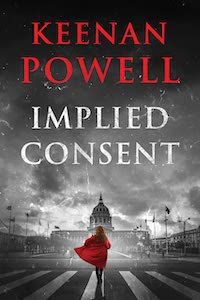
What Mystery Novels Get Wrong about the Courtroom
There’s nothing quite as dramatic as a courtroom scene, whether it’s in a book, onstage, or on-screen. Someone is literally on trial; their life (or at the very least their freedom) may be on the line. It’s a scene that naturally breeds tension, a perfect addition to any murder mystery. While a court of law looks for nothing but the truth, depictions of courtrooms can stretch the truth in fiction. We’re going to take a look at a few common tropes used in the courtroom.
Before we dive in, I want to mention that many books and other entertainment show lawyers in the courtroom in front of juries a lot. Sadly, in real life, most cases are concluded long before they go to trial. Lawyers may go to court for hearings, sentencing, etc., but an actual trial is fairly uncommon.
Surprise!
We’ve read/seen it — it’s looking bad for the hero in the courtroom. The case is not going the way they hoped. But then, there’s a last-minute addition to the case: a surprise witness or new evidence. While it definitely feels satisfying to see our heroes succeed, in practice, this kind of surprise in court is very rare.
Craig Pittman, an author and journalist who covered Florida’s criminal courts, said in an article on CrimeReads, “[I]n the 60 murder trials I covered, only two featured testimony from surprise witnesses.” He noted that in both cases, the surprises were for the prosecution and helped destroy the defendant’s story.
Rick Acker, deputy attorney general in the California Department of Justice, wrote in 2015 about surprises in the courtroom, “The opposing lawyers get to ask each other all sorts of questions, and only an incompetent lawyer will fail to ask what witnesses the other side plans to put on the stand and what exhibits they plan to put into evidence.”
The Gotcha Question
Another common trope is the gotcha question. One lawyer is questioning a witness or the antagonist on the stand and they ask one last question. The witness sputters and ends up revealing critical info or even confessing to the crime. It’s a wonderfully dramatic moment and it’s obvious why it happens in fiction.
However, one important rule that lawyers learn from law school is never to ask anyone a question on the stand that the lawyer does not know the answer to. The lawyer may feel they’ve got that gotcha moment, but the person on the stand may outright contract or deny what the lawyer is saying. Keenan Powell, author of Ippy Gold Medal-winning Implied Consent, said, “If you break that rule, you will get bitten, 9 times out of ten.”
The lawyer may ask a series of questions that lead to that gotcha question without actually asking that. Obviously, the lawyer would know the answers to those questions. This tactic lets the jury take the next step without letting the witness wiggle out of it.
The exception to the rule, Powell noted, is when you don’t care what the witness says.
Speedy Sentencing
Here’s another common one: the defendant has been found guilty and the judge hands out their sentence. Unfortunately, that’s for narrative ease. Mystery writer of the Spice Shop Mysteries and attorney Leslie Budewitz wrote on her blog, “Sentencing is a separate proceeding, usually held after a pre-sentence investigation by a probation officer or other investigator (terminology varies). Prosecutors and defense counsel need time to review the report and make recommendations. A few weeks is typical.” Sometimes it can be quicker, but generally, it’s not immediately right after a guilty verdict is read.
Powell noted that after the conviction, there’s a lot of work for the pre-sentencing report, including reviewing the person’s background, character witnesses and victims, financial condition, etc., that will be given to the defense and prosecution. She said that this process “keeps the defense and the prosecution from bringing all the surprise witnesses to the sentencing and turning it into a giant trial.” The convicted person also gets an opportunity to speak for themselves (elocution rights). This whole process can take months, and even the sentencing hearing can take several hours.
Conversational Court
While we’ve read and seen lawyers who get into arguments with each other in the courtroom during trial, that is done for narrative expediency. In reality, Acker pointed out, “lawyers can only speak to the judge or (during opening statements or closing arguments) the jury. They aren’t allowed to argue directly with each other. And they can’t interrupt each other.”
Attorneys cannot freely move around the courtroom without the judge’s permission. Powell noted that you have to ask permission from the judge to go into the “well” — the area in front of the judge — even to approach the witness or jury. If you know the judge well enough and their temperament, you may be able to move around the well, but as a general rule, ask permission.
Powell also noted that lawyers are not supposed to explain their objection and turn it into a big argument. She noted, “You will not get away in American court with what they do on British television courtroom scenes.” She also mentioned that sometimes the terminology can be off as well: there are only opening statements and closing arguments; there are no such thing as opening arguments.
These are just a few things that differ between fictional courtrooms and real ones. These differences often lie in the desire to make an interesting story. Powell pointed out that both Michael Connelly and John Grisham do a great job of depicting a real courtroom.
If you want more on what murder mysteries get wrong, here’s a recent post on wills and another on the food industry.












